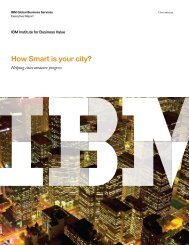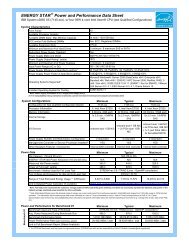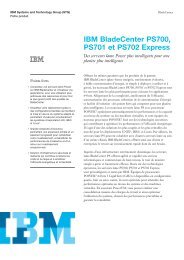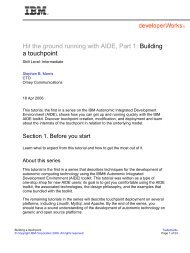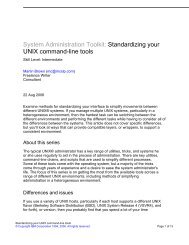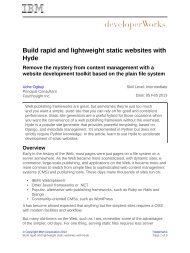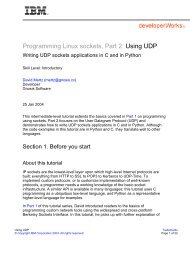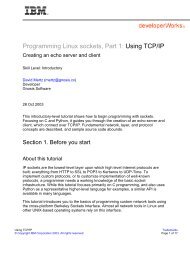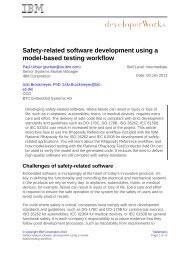Build a digital book with EPUB The open - IBM
Build a digital book with EPUB The open - IBM
Build a digital book with EPUB The open - IBM
Create successful ePaper yourself
Turn your PDF publications into a flip-book with our unique Google optimized e-Paper software.
developerWorks® ibm.com/developerWorks/<br />
Listing 19. Create the mimetype file<br />
def create_mimetype(path='/path/to/our/epub/directory'):<br />
f = '%s/%s' % (path, 'mimetype')<br />
f = <strong>open</strong>(f, 'w')<br />
# Be careful not to add a newline here<br />
f.write('application/epub+zip')<br />
f.close()<br />
Creating the <strong>EPUB</strong> bundle <strong>with</strong> Python<br />
All that's left now is to bundle the files into a valid <strong>EPUB</strong> ZIP archive. This takes two<br />
steps: adding the mimetype file as the first in the archive <strong>with</strong> no compression, then<br />
adding the remaining directories. Listing 20 shows the code for this process.<br />
Listing 20. Using the Python zipfile module to create an <strong>EPUB</strong> bundle<br />
import zipfile, os<br />
def create_archive(path='/path/to/our/epub/directory'):<br />
'''Create the ZIP archive. <strong>The</strong> mimetype must be the first file in the archive<br />
and it must not be compressed.'''<br />
epub_name = '%s.epub' % os.path.basename(path)<br />
# <strong>The</strong> <strong>EPUB</strong> must contain the META-INF and mimetype files at the root, so<br />
# we'll create the archive in the working directory first and move it later<br />
os.chdir(path)<br />
# Open a new zipfile for writing<br />
epub = zipfile.ZipFile(epub_name, 'w')<br />
# Add the mimetype file first and set it to be uncompressed<br />
epub.write(MIMETYPE, compress_type=zipfile.ZIP_STORED)<br />
# For the remaining paths in the <strong>EPUB</strong>, add all of their files<br />
# using normal ZIP compression<br />
for p in os.listdir('.'):<br />
for f in os.listdir(p):<br />
epub.write(os.path.join(p, f)), compress_type=zipfile.ZIP_DEFLATED)<br />
epub.close()<br />
That's it! Remember to validate.<br />
Section 6. Summary<br />
<strong>The</strong> Python script in the previous section is just a first step in fully automating any<br />
kind of <strong>EPUB</strong> conversion. For the sake of brevity, it does not handle many common<br />
cases, such as arbitrarily nested paths, stylesheets, or embedded fonts. Ruby<br />
fans can look at dbtoepub, included in the DocBook XSL distribution, for a similar<br />
approach in that language.<br />
Because <strong>EPUB</strong> is a relatively young format, many useful conversion paths still await<br />
creation. Fortunately, most types of structured markup, such as reStructuredText or<br />
<strong>Build</strong> a <strong>digital</strong> <strong>book</strong> <strong>with</strong> <strong>EPUB</strong> Page 20 of 25



